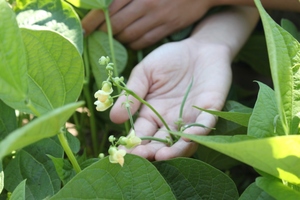
Yesterday I took a little bit of a swipe at Bon Appétit Management’s cage-free SHELL egg commitment
asking whether or not such move could push the $590 billion commercial food-service market to raise animal welfare standards nationally.
Today Bon Appétit (BAMCO) is back in the news with a compelling initiative that preserves summer produce for fall/winter consumption. The food-service firm has worked with the Center for Innovative Food Technology to flash freeze ripe Ohio-grown green beans and strawberries. Chefs at Case Western Reserve University in Cleveland will be able to incorporate these local ingredients into their menus well after the final summer berries have peaked.
Four farms will participate in the pilot this fall and all are within a 150-mile radius of the campus. Johnston Fruit Farm is among the partners in the micro-processing project this fall. Owner Martha Mora harvested over 14,000 pounds of green beans this past summer in Swanton, Ohio that will then be frozen in batches for later use by Bon Appétit chefs for their Ohio schools. “This effort from Bon Appétit is exciting for us, because it could become a model for our customers throughout the region,” said Mora. “We are thrilled that we can ensure our crop’s longevity and count on revenue during a typically slow time of year.”
“For three years, our team has explored how to capture the vibrant flavors and nutrition that only the summer sun can offer,” said Bon Appétit CEO Fedele Bauccio. “We are very excited that our students at Case Western Reserve University and Oberlin College will be the first to enjoy this delicious produce any time of year. Micro-processing allows us to continue our investment in local farmers and their terrific food year-round, and we look forward to bringing this approach to our other clients in the future.”
According to a press release, Bon Appétit will spend $50,000 on the micro-processing pilot in Ohio.
Now the real test: can this initiative scale? Is California losing sleep over lost winter bean revenue?





